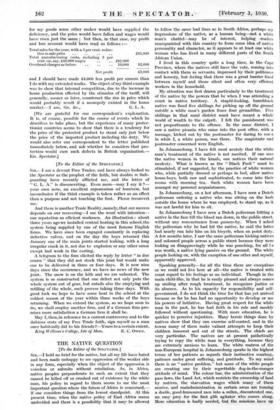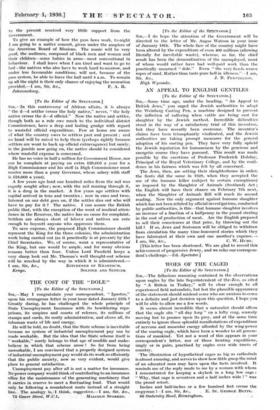THE NATIVE ' QUESTION
[To the Editor of the SPEcrAroa.]
SIR,—I hold no brief for the native, but all my life have hated and been made unhappy to see oppression of the weaker side in any form, especially when the object of the oppression, is voiceless or submits without retaliation. As, in Africa, native peoples preponderate to such, an extent that _they cannot be killed off or crushed out of existence by the white man, his policy in regard to them seems to me the most important question where the future of Africa is coneerned,— if one considers things from the lowest standpoint. At this present time, when the native policy of East Africa seems undecided and there is a possibility that it may be allowed to follow the same bad -lines-as in South Africa, perhaps my impressions of the native, as a human being—not a white man's chattel—may be of interest, helping -readers unacquainted with this country to form some idea of native personality and character, as it appears to at least one white woman who has lived in many different parts of the South African Union.
I lived in this country quite a long time, in the . Cape Province, where the natives still have the vote, coming into contact with them as servants, impressed by their politeness and honesty, but feeling that there was a great barrier fixed between myself and those silent and often very- efficient workers in the household.
My attention was first drawn particularly to the treatment of the native by the powers that be when I was attending a court in native territory. A stupid-looking, hunchback native was fined five shillings for picking up off the ground outside a white man's garden fence four grenadillas. Five shillings in that rural district must have meant a whole world of wealth to the culprit. I felt the punishment, was not proportionate to the offence. In the same district, I saw a native picanin who came into the post office, with a message, kicked, out by the postmaster for daring to come in while I, a white person, was there. The magistrate and postmaster concerned were English.
In Johannesburg, I have felt most acutely that the white man's treatment of the native is not merited. If one sees the native women in the kraals, one notices their natural modesty. What is known as the " Black Peril " must be stimulated, if not suggested, by the practice. of white women who, while partially dressed or perhaps in bed, allow native house-boys, both raw and sophisticated, to _come into their rooms with morning tea.. Such white women have been amongst my personal acquaintances. . -
In Johannesburg, on a hot afternoon, I have seen a Dutch policeman ordering a native who was sitting on the -kerb outside the house where he was employed, to stand up, as it was not lawful for him to sit.
In Johannesburg I have seen a Dutch policeman hitting a native in the face-till the blood ran down, in the public street, without any remonstrance from passers-by. When I asked the policeman why he had hit the native, he said the latter had nearly run into him on his bicycle, when on point duty. A few months later, I saw the same policeman kicking natives and coloured people across a public street because they were looking on disapprovingly while he was punching, for all to was worth, a native lying passive on the ground. The white people looking on, with the exception of one other and myself, apparently approved.
Speaking generally—for all the time there are exceptions or we could not live here at all—the native is treated with scant regard to his feelings as an individual. Though in the main child-like, in that he is easily pleased and always comes up smiling after rough treatment, he recognizes justice or its absence. As to his capacity for responsibility and self- government, I do not think the time for that has yet arrived because so far he has had no opportunity to develop or use his powers of initiative. Having great respect for the white man in the past, he has had faith in his rule and meekly followed without questioning. With more education, he is quicker to perceive injustices. Many heroic things done by natives show that they can exercise self-control, and in the towns many of them make valiant attempts to keep their children innocent and out of the streets. The chiefs are very particular. The natives are at present pathetically trying to copy the white man in everything, because they are extremely anxious to learn. The white matron of the non-European hospital in Johannesburg speaks in the highest terms of her patients as regards their instinctive courtesy, patience under great suffering, and gratitude. To my mind there is no " native problem," but some of the white people are creating one by their regrettable dog-in-the-manger attitude of mind. The colour bar, the administration of the pass laws, the Land Act, which restricts the ownership of land by natives, the starvation wages which many of them receive, and maladministration in certain areas are turning a docile, good-humoured race into a sullen, discontented one, an easy prey for the first glib agitator who comes along. More education is badly needed, but the missions have up to the present received very little support from the Government.
To give an example of how the pass laws work, to-night I am going to a native concert, given under the auspices of the American Board of Missions. The music will be very good, the audience, composed of black men and women and their children—some babies in arms—most conventional in behaviour. I shall leave when I am tired and want to go to bed—the natives who also have to work hard to-morrow, and under less favourable conditions, will not, because of the pass system, be able to leave the hall until 4 a.m. To remain up all the night is their only chance of enjoying the recreation







































 Previous page
Previous page